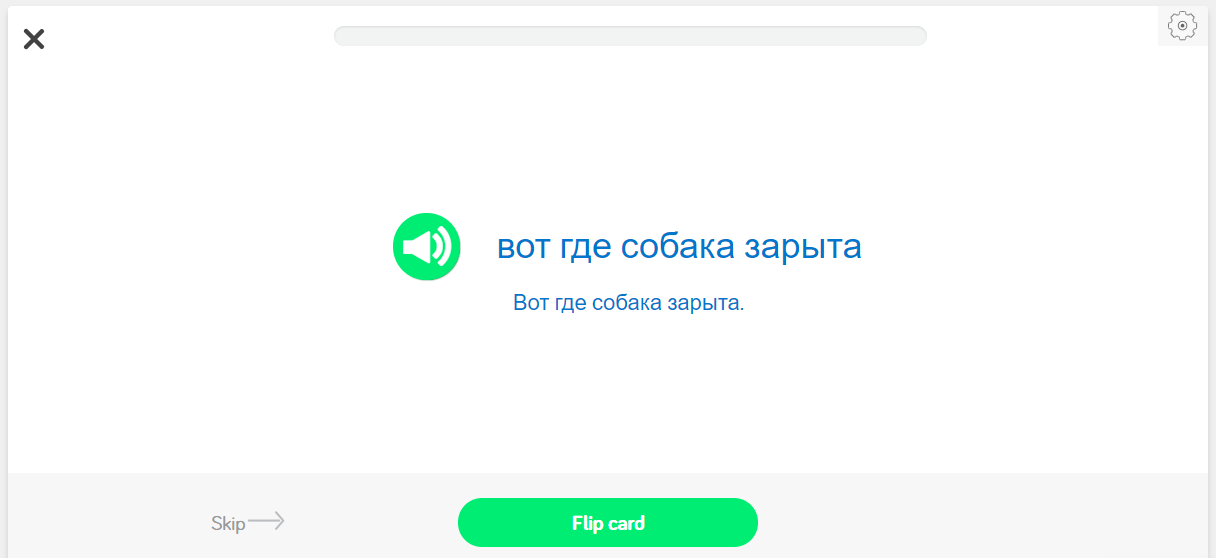29 Russian Idioms to Get Your Head Around
Idioms are phrases with overall meanings that are different than the meaning of the words that make them up. Just like in English, there are hundreds of weird and wonderful Russian idioms.
In English, when you say ‘It’s raining cats and dogs’ you don’t imply that cats and dogs are falling from the sky. Every native English speaker knows you are talking about heavy rain. However, to a Russian speaker who is on an English language learning journey, this expression does not make any sense.

The same is true for Russian idioms. Since there are Russian words that don’t exist in English, many idioms don’t make sense even when they are translated. In this post, we will consider that most frequently used Russian phraseological expressions and hopefully you’ll get to understand at least a few of them.
29 Common Russian Idioms
The best way to learn idioms is in context, and that’s exactly how you learn on LingQ. The Russian library is packed full of lessons on all kinds of topics. You could even use the idioms below and make your own lesson. That way you can translate the words and phrases and add them to your personal Russian dictionary. Check it out!

Делать из мухи слона [delat’ iz mukhi slana]
This literally means ‘to make an elephant out of a fly’.
Its English equivalent would be ‘To make mountains out of molehills’.
Не в своей тарелке [ni v svayey tarelki]
This idiom can be translated as ‘(to be) not in one’s own plate’.
The idiom means ‘to be like a fish out of water’, to feel uncomfortable in a situation.
Заткнуть (кого-то) за пояс [zatknut’ (kago ta) za poyas]
This one is translated as ‘to put (someone) under one’s belt’.
The expression means ‘to outshine someone’, ‘get the better of sb.’
Остаться с носом [astat’sya s nosam]
It literally means ‘be left with the nose’ and in fact suggests that someone failed at something, was fooled around or did not get an expected result. A similar English expression used in this context: ‘be left holding the bag’ or ‘be duped’.

Водить за нос [vadit’ za nos]
Another idiom about noses. This means ‘to lead (someone) grabbing at their nose’, to fool around with someone.
Now it’s time to explain the etymology of this idiom. In the past, during bazaars and outside fairs, gypsies would bring tame bears with them and make them perform. The animals had their noses pierced, and the owners would lead the bears holding on to a ring through their noses. Thus, animals had no chance but to obey.
Где раки зимуют [gde raki zimuyut]
This idiom is translated as ‘where crawfish hibernates’ and is usually used in the following context: “I will show you where crawfish hibernates”. What a Russian person means by saying this is that they want to punish you cruelly for something or teach you a lesson.
Originally, Russian landlords considered shellfish to be a delicacy, especially when caught in winter. Because crawfish are hard to catch (the water was freezing), they sent peasants who had committed a crime to catch them. That’s how the idiom came about.

Когда рак на горе свистнет [kagda rak na gare svisnit]
Another idiom featuring crawfish. This means ‘when a crawfish whistles on the mountain’ and means it’s never going to happen. The English equivalent is ‘in a pig’s eye’.
Дать зуб [dat’ zub]
This one means ‘to give a tooth’: you swear your words are true, and you are even ready to sacrifice your tooth as proof.
Дойти до ручки [dayti da ruchki]
This idiom means ‘to reach the handle’ or ‘to reach rock bottom’. The handle refers to the part of a traditional Russian bread that was not eaten as it had been held by different people. The handle was given to dogs or poor people. So if someone ‘reached the handle’, that meant they were eating leftovers that dogs normally ate.

И ежу понятно [I izhu panyatna]
Translates to: ‘even a hedgehog understands’. The idiom means ‘it’s a no-brainer’.
Ни рыба ни мясо [ni ryba ni myasa]
This means ‘neither fish nor meat’ and is used to describe a mediocre person. It can also be translated as ‘wishy-washy’ or ‘wimp’ in some contexts.
Кот наплакал [kot naplakal]
This idiom means ‘very little’ or ‘hardly enough’ and translates to ‘cat wept’.
Одна нога здесь, другая там [adna naga zdes’, drugaya tam]
The literal translation of this idiom is ‘one leg is here, another leg is there’. A Russian speaker would use this idiom to give someone an order to go and fetch or do something really quickly.

Два сапога пара [dva sapaga para]
This idiom suggests that two people are very similar in their behaviour or have the same characteristics. The English equivalent is ‘cut from the same cloth’.
Денег куры не клюют [denig kury ne klyuyut]
The translation of this idiom: ‘chickens don’t peck at money’. The phrase is used to denote that someone is wealthy. It’s hard to find a logical explanation for this idiom!
Глаза разбегаются [glaza razbigayutsya]
This one means ‘eyes scatter’ and is applied when there is a wide choice , and you don’t know what to lay your eyes on first. Anyone who goes shopping to their favourite shoe store during the sales knows that feeling.

Одной левой [adnoy levay]
This phrase means that a person can complete something with their left hand, i.e., a task is very easy and translates to ‘with one left’. The English equivalent is ‘single-handedly’.
В ус не дуть [v us ni dut’]
This idiom has a similar meaning to the English ‘not turn a hair’, i.e., when a person does not give a damn. The translation is roughly ‘not to blow at the whisker’.

Спустя рукава [spustya rukava]
This idiom translates in English to ‘with sleeves rolled down’. It means that a job or atask was done carelessly or badly, without giving it proper attention. The opposite English idiom is ‘to roll up your sleeves’.
В шоколаде [v shekalade]
This phrase is usually used in the context ‘everything is in chocolate’ or ‘everything will be in chocolate’. As you might have guessed, this means to have a comfortable life without any hardships.
Work is not a wolf, it won’t escape into the forest.
Plainly put, take a break from work! It’ll be there when you come back. What I want to know is: how many wolves were Russians letting escape into the forest? Were Russians really that bad at keeping wolves?

Вот где собака зарыта
That’s where the dog is buried.
A rather morbid way of saying that you’ve discovered to the root of the problem. Clearly, not only were Russians bad at keeping wolves, but they were also terrible at burying their dogs.
Дружба дружбой, а табачок – врозь
Friendship is friendship, but let’s keep our tobacco apart.
Understandably, friends are all well and good until money – or tobacco – gets involved.
Любовь зла, полюбишь и козла
Love is mean, you could fall in love with a goat.
The general idea is that you don’t choose who you love. In Russian, anything is possible and you could fall in love with a goat.
В семье, не без урода
There’s an ugly person in every family.
So the English equivalent is being the “black sheep”, which I think I prefer, because I feel sorry for whoever inspired this particular idiom.
Дураков не сеют, не жнут, сами родятся
Fools are not sown nor reaped, they appear by themselves.
Possibly my favourite saying, and so cutting. No one makes fools, but they’re everywhere. Imagine how you could insert this into a conversation?
Говорят, что кур доят
They say they milk chickens.
Don’t believe everything you hear. However, starting a rumour that someone milks chickens would make for some interesting gossip.

Исподволь и ольху согнёшь
You can bend an alder-tree if you do it slowly.
An alder tree is a tree which belongs to the birch family. Russians love birch trees, and an alder tree one is a particularly big one. The idea of this is that you can do anything if you have enough time. Even bend a giant tree.
Не делай из мухи слона
Don’t make an elephant out of a fly.
So…we say “don’t make a mountain out of a molehill” but Russians clearly had bigger ideas. Molehills? Mountains? Pfft. Try flies and elephants and get back to us.
Первый блин всегда комом
The first pancake is always a blob.
Russians love their blini, and the blini have not escaped the Russian idiom! The first pancake is always a bit rubbish, but the second, third and fourth get better and better. So, I guess, we have to crawl before we can walk.

Try and pepper these throughout your conversations…
Nothing will make a Russian happier than hearing you embrace their odd sayings. Try a few out on some Russian friends, there are plenty more out there that you can get your hands on!
Russian Idioms on LingQ
Using LingQ (available for both Android and iOS) you can import your favorite Russian idioms and create organized study lessons either on your computer or on mobile. As you can see below, I’ve added a few Russian idioms from this post into LingQ. By clicking each word (or sentence), LingQ will pull up a dictionary to help me know what I am reading. I can also click on the audio icon to hear how the word is pronounced. Also, every word or sentence that I click on automatically gets saved into my vocabulary library which I can review later.


More than Just Russian Idioms
If you have found Russian content that you enjoy, you can also import that into LingQ (as long as you have the transcript). Podcasts are great for this.
For example, Real Russian Club is a great podcast and provides audio and transcripts that can easily be imported into LingQ and turned into an interactive lesson. You can follow along and read the transcript, listen to the audio, and save new vocabulary you come across. It’s not only more organized to study this way but also more enjoyable.

So what are you waiting for? Check out LingQ today to discover how to learn Russian fast using content you love!
***
Ievgeniia Logvinenko holds a Master’s degree in English philology and is passionate about languages. In addition to English, she speaks Russian, Ukrainian, Polish, German and basic French.
